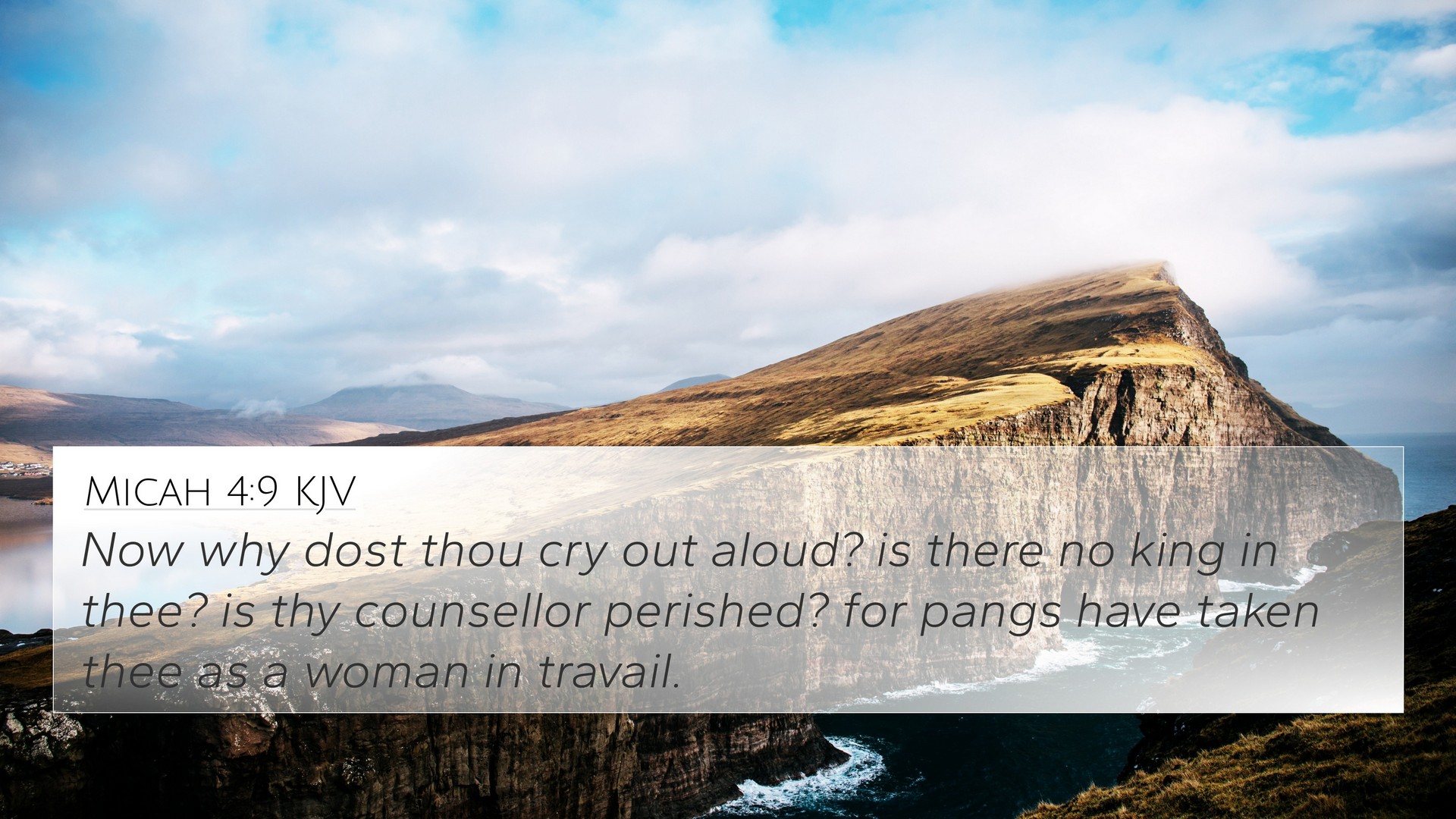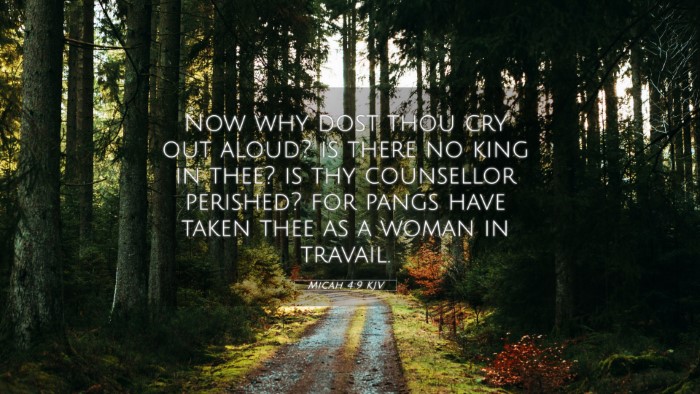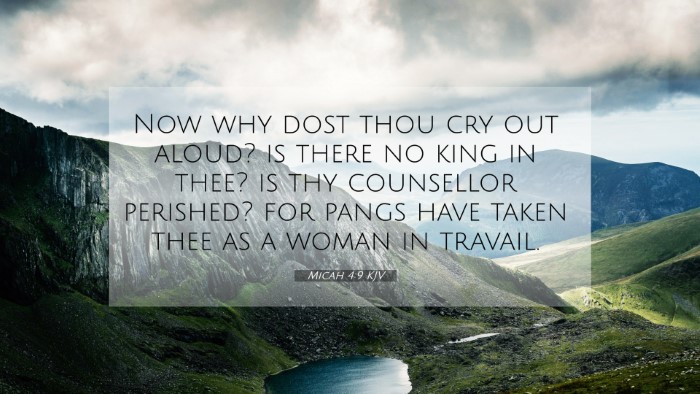Old Testament
Genesis Exodus Leviticus Numbers Deuteronomy Joshua Judges Ruth 1 Samuel 2 Samuel 1 Kings 2 Kings 1 Chronicles 2 Chronicles Ezra Nehemiah Esther Job Psalms Proverbs Ecclesiastes Song of Solomon Isaiah Jeremiah Lamentations Ezekiel Daniel Hosea Joel Amos Obadiah Jonah Micah Nahum Habakkuk Zephaniah Haggai Zechariah MalachiMicah 4:9 Similar Verses
Micah 4:9 Cross References
Now why dost thou cry out aloud? is there no king in thee? is thy counsellor perished? for pangs have taken thee as a woman in travail.
Uncover the Rich Themes and Topics of This Bible Verse
Listed below are the Bible themes associated with Micah 4:9. We invite you to explore each theme to gain deeper insights into the Scriptures.
Micah 4:9 Cross Reference Verses
This section features a detailed cross-reference designed to enrich your understanding of the Scriptures. Below, you will find carefully selected verses that echo the themes and teachings related to Micah 4:9 KJV. Click on any image to explore detailed analyses of related Bible verses and uncover deeper theological insights.
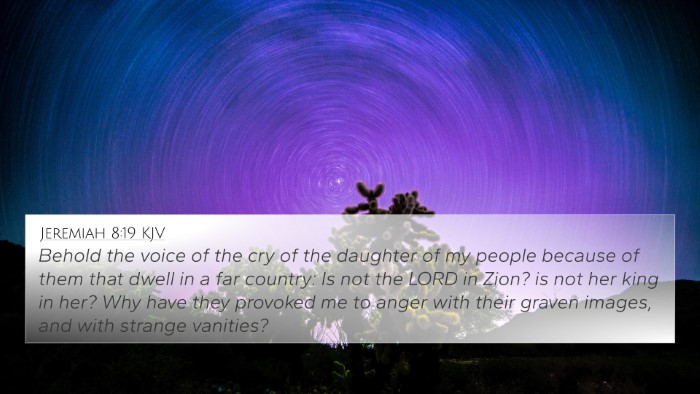
Jeremiah 8:19 (KJV) »
Behold the voice of the cry of the daughter of my people because of them that dwell in a far country: Is not the LORD in Zion? is not her king in her? Why have they provoked me to anger with their graven images, and with strange vanities?
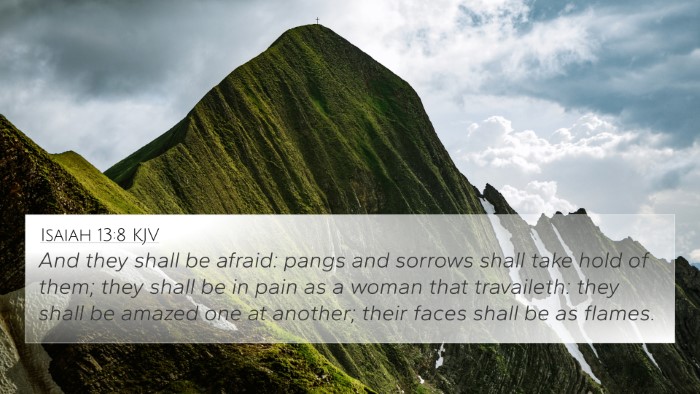
Isaiah 13:8 (KJV) »
And they shall be afraid: pangs and sorrows shall take hold of them; they shall be in pain as a woman that travaileth: they shall be amazed one at another; their faces shall be as flames.
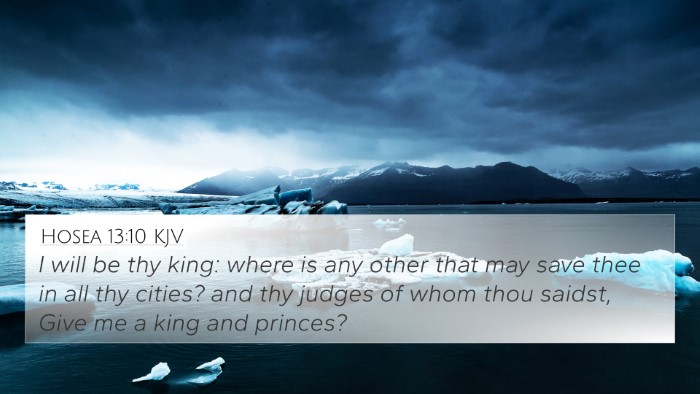
Hosea 13:10 (KJV) »
I will be thy king: where is any other that may save thee in all thy cities? and thy judges of whom thou saidst, Give me a king and princes?
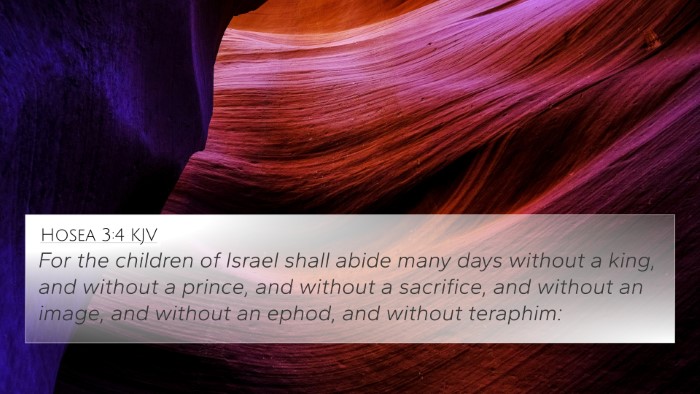
Hosea 3:4 (KJV) »
For the children of Israel shall abide many days without a king, and without a prince, and without a sacrifice, and without an image, and without an ephod, and without teraphim:
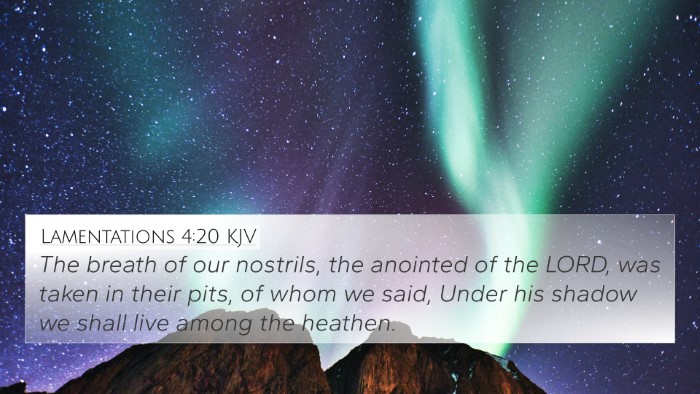
Lamentations 4:20 (KJV) »
The breath of our nostrils, the anointed of the LORD, was taken in their pits, of whom we said, Under his shadow we shall live among the heathen.
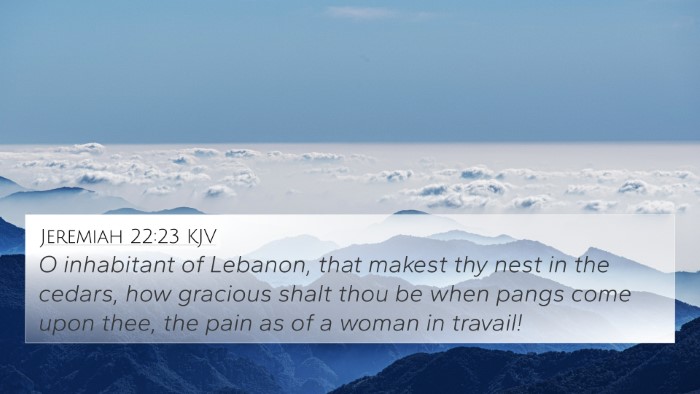
Jeremiah 22:23 (KJV) »
O inhabitant of Lebanon, that makest thy nest in the cedars, how gracious shalt thou be when pangs come upon thee, the pain as of a woman in travail!
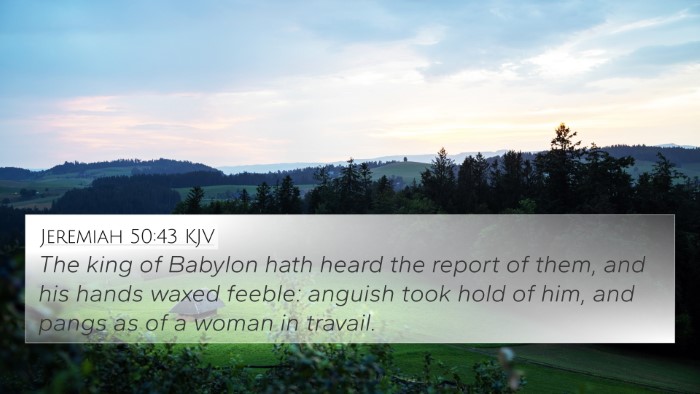
Jeremiah 50:43 (KJV) »
The king of Babylon hath heard the report of them, and his hands waxed feeble: anguish took hold of him, and pangs as of a woman in travail.

Jeremiah 30:6 (KJV) »
Ask ye now, and see whether a man doth travail with child? wherefore do I see every man with his hands on his loins, as a woman in travail, and all faces are turned into paleness?
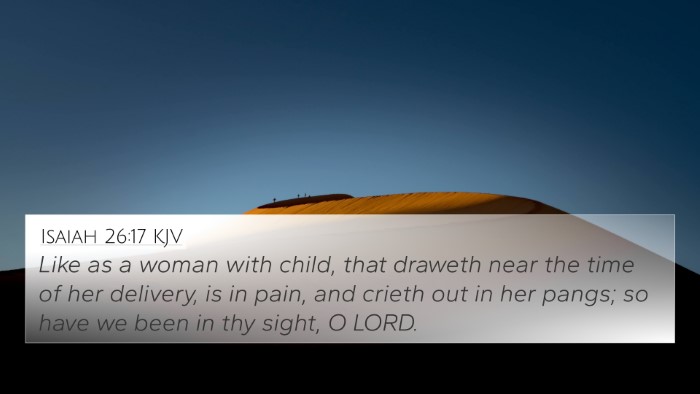
Isaiah 26:17 (KJV) »
Like as a woman with child, that draweth near the time of her delivery, is in pain, and crieth out in her pangs; so have we been in thy sight, O LORD.
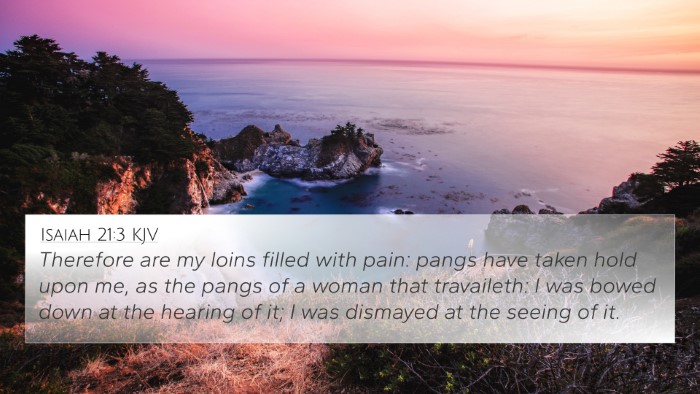
Isaiah 21:3 (KJV) »
Therefore are my loins filled with pain: pangs have taken hold upon me, as the pangs of a woman that travaileth: I was bowed down at the hearing of it; I was dismayed at the seeing of it.
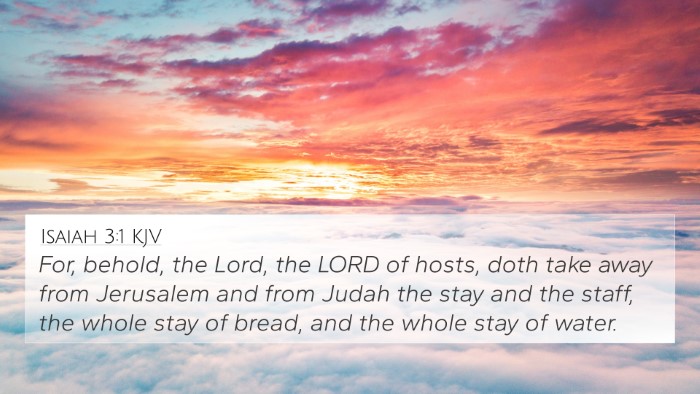
Isaiah 3:1 (KJV) »
For, behold, the Lord, the LORD of hosts, doth take away from Jerusalem and from Judah the stay and the staff, the whole stay of bread, and the whole stay of water.
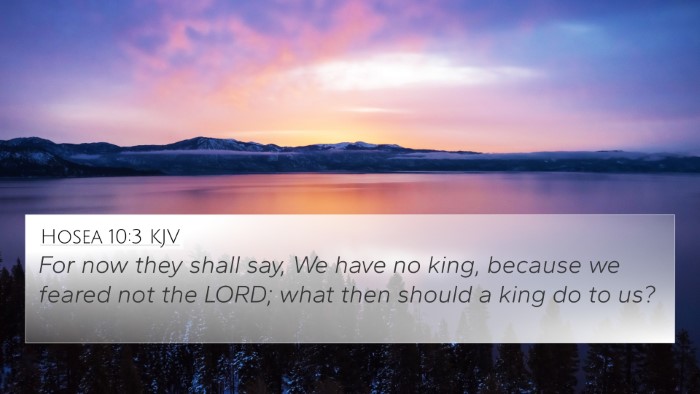
Hosea 10:3 (KJV) »
For now they shall say, We have no king, because we feared not the LORD; what then should a king do to us?
Micah 4:9 Verse Analysis and Similar Verses
Understanding Micah 4:9
Micah 4:9 reads: "Now why dost thou cry out aloud? is there no king in thee? is thy counsellor perished? for pangs have taken thee as a woman in travail."
Verse Summary
This verse poses a rhetorical question that addresses the people of Israel during a time of distress. The imagery of a woman in labor signifies intense suffering and indicates the seriousness of their situation. Micah challenges the leaders and the people to reflect on their political and spiritual state, questioning the absence of a king and the failure of their advisors.
Interpretations from Commentaries
-
Matthew Henry:
Henry stresses the despair of the people, highlighting the failure of leadership in providing guidance and protection. He compares their suffering to the pains of childbirth, noting that such pain heralds a new beginning or deliverance. This is a reminder that in their low state, hope is not lost.
-
Albert Barnes:
Barnes focuses on the absence of a king and counselor, indicating a lack of divine guidance as Israel faces imminent threats. He points out that the cry for help is born out of desperation, suggesting that their troubles stem from reliance on earthly leaders instead of trust in God.
-
Adam Clarke:
Clarke examines the metaphor of childbirth, interpreting the pangs as a both literal and metaphorical reflection of the nation’s struggles. He emphasizes that this time of adversity could lead to new joy and restoration, stressing the cyclical nature of suffering and joy throughout Israel’s history.
Cross-References and Relations
Micah 4:9 connects with several other verses in the Bible that reflect similar themes of distress, leadership, and hope:
- Jeremiah 30:6-7: Talks about the pains of a woman in labor and the time of Jacob's trouble, emphasizing deliverance.
- Lamentations 2:9: Describes the suffering of the people due to lost leadership, resonating with Micah's theme.
- Isaiah 26:17-18: Uses similar imagery of childbirth to represent the anguish of the people and their future restoration.
- Hosea 13:13: Compares Israel's suffering to the birth pangs of a woman, linking the themes of pain and subsequent revival.
- Isaiah 37:3: Acknowledges the situation of Israel and the need for divine intervention in times of crisis.
- Psalm 48:14: Reminds believers that God will guide them, reinforcing the contrast of relying on human leaders versus divine guidance.
- Matthew 24:8: Refers to the beginning of sorrows, paralleling the metaphor of labor associated with the approaching kingdom.
- Acts 1:6-7: Highlights the importance of divine authority in leadership, drawing a parallel to the need for a king in Micah’s message.
- Revelation 12:2: Uses the imagery of a woman in labor to portray the struggles of the people of God and the coming new era.
Thematic Connections
The verse presents several thematic connections that can guide further study:
- Leadership: The absence of a king signifies a deeper spiritual crisis.
- Suffering and Hope: The labor pains indicate imminent struggle but also a prospective new beginning.
- Divine Guidance: The need for a counselor highlights reliance on God rather than human wisdom.
When cross-referencing Biblical texts, Micah 4:9 serves as a focal point to explore the relationship between God's sovereignty, Israel's historical challenges, and the prophetic hope for restoration and relief.
Tools for Bible Cross-Referencing
For those interested in deeper analysis, tools such as Bible concordances, cross-reference guides, and thematic studies can aid understanding. Methods for effective Bible cross-referencing include:
- Identifying Key Themes: Look for recurring themes throughout scripture.
- Comparative Analysis: Engage in detailed studies of similar texts across different books.
- Using Reference Resources: Utilize reference materials and studies to explore connections.
Conclusion
Micah 4:9 encapsulates a crucial moment of reflection for the people of Israel, emphasizing the themes of leadership, suffering, and the expectation of divine intervention. By understanding this verse within the context of cross-referencing other biblical texts, one can appreciate the interconnectedness of God’s message throughout scripture and its relevance today.
